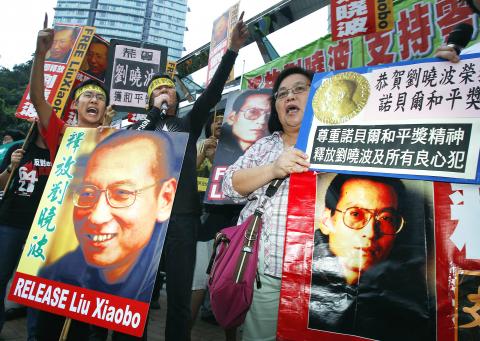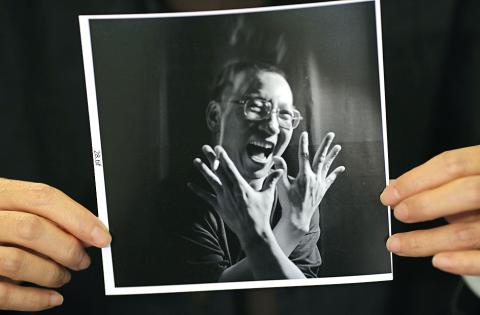Imprisoned Chinese dissident Liu Xiaobo (劉曉波), a key participant in the “Charter 08” initiative, was awarded this year’s Nobel Peace Prize yesterday for using non--violent means to demand fundamental human rights in his homeland, igniting a furious response from China, which accused the Norwegian Nobel Committee of violating its own principles by honoring “a criminal.”
Chinese state media immediately blacked out the news and Chinese government censors blocked Nobel Prize reports from Web sites. China declared the decision would harm its relations with Norway, while the Nordic country responded that was a petty thing for a world power to do.
Hours after the announcement, President Ma Ying-jeou (馬英九) congratulated Liu for winning the prize and called on China to address human rights issues with a more liberal attitude.

PHOTO: REUTERS
In a written statement, Ma described Liu’s winning the award as bearing “significant historical meaning” for the development of human rights in China, as well as Chinese communities around the world.
“We expect mainland China to address the issue of human rights with a whole new attitude, solve major human rights incidents with honesty and confidence, and treat dissidents with more tolerance,” Ma said.
The Chinese Nationalist Party (KMT) also congratulated Liu.

PHOTO: REUTERS
“Freedom, democracy and human rights are universal values, and Mr Liu’s winning the award at this time bears significant meaning,” KMT spokesman Su Jun-pin (蘇俊賓) said.
Presidential Office spokesman Lo Chih-chiang (羅智強) said Ma reiterated comments made previously on the anniversary of the Tiananmen Square Massacre that, in addition to economic development, China should seek breakthroughs in the development of human rights.
This year’s peace prize followed a long tradition of honoring dissidents around the world and was the first Nobel for China’s dissident community since it resurfaced after the Chinese Communist Party launched economic, but not political, reforms three decades ago.
Liu, 54, was sentenced last year to 11 years in prison for subversion. The Nobel committee said he was the first to be honored while still in prison, although other winners have been under house arrest or imprisoned before getting the prize.
Chinese authorities would not allow access to Liu yesterday.
His wife, however, expressed joy at the news. Surrounded by police at their Beijing apartment, Liu Xia (劉霞) was not allowed out to meet reporters. Instead, she gave brief remarks by phone and text message, saying she was happy and that she planned to go today to deliver the news to Liu Xiaobo at the prison, 500km away.
The Chinese Foreign Ministry lashed out at the Nobel decision, saying the award should have been used instead to promote international friendship and disarmament.
“Liu Xiaobo is a criminal who has been sentenced by Chinese judicial departments for violating Chinese law,” the statement said.
Honoring him “runs completely counter to the principle of the prize and is also a blasphemy to the peace prize,” it said.
The Dalai Lama also issued his public congratulations to Liu Xiaobo.
“I would like to take this opportunity to renew my call to the government of China to release Liu Xiaobo and other prisoners of conscience, who have been imprisoned for exercising their freedom of expression,” the spiritual leader said.
In a statement, released minutes after the announcement of the award, the Democratic Progressive Party (DPP) said it welcomed the decision to award Liu Xiaobo, adding that it was “deeply concerned” about the state of human rights in China
“Democracy, freedom and human rights are universal values,” the DPP said. “Liu [Xiaobo’s movement] was a call on the Chinese government to realize human rights and start democratic reform, leading to a democratic constitution.”
The party also said the government should redouble efforts to try to export democratic and human rights values to China through greater cross-strait exchanges.

Right-wing political scientist Laura Fernandez on Sunday won Costa Rica’s presidential election by a landslide, after promising to crack down on rising violence linked to the cocaine trade. Fernandez’s nearest rival, economist Alvaro Ramos, conceded defeat as results showed the ruling party far exceeding the threshold of 40 percent needed to avoid a runoff. With 94 percent of polling stations counted, the political heir of outgoing Costa Rican President Rodrigo Chaves had captured 48.3 percent of the vote compared with Ramos’ 33.4 percent, the Supreme Electoral Tribunal said. As soon as the first results were announced, members of Fernandez’s Sovereign People’s Party

MORE RESPONSIBILITY: Draftees would be expected to fight alongside professional soldiers, likely requiring the transformation of some training brigades into combat units The armed forces are to start incorporating new conscripts into combined arms brigades this year to enhance combat readiness, the Executive Yuan’s latest policy report said. The new policy would affect Taiwanese men entering the military for their compulsory service, which was extended to one year under reforms by then-president Tsai Ing-wen (蔡英文) in 2022. The conscripts would be trained to operate machine guns, uncrewed aerial vehicles, anti-tank guided missile launchers and Stinger air defense systems, the report said, adding that the basic training would be lengthened to eight weeks. After basic training, conscripts would be sorted into infantry battalions that would take

GROWING AMBITIONS: The scale and tempo of the operations show that the Strait has become the core theater for China to expand its security interests, the report said Chinese military aircraft incursions around Taiwan have surged nearly 15-fold over the past five years, according to a report released yesterday by the Democratic Progressive Party’s (DPP) Department of China Affairs. Sorties in the Taiwan Strait were previously irregular, totaling 380 in 2020, but have since evolved into routine operations, the report showed. “This demonstrates that the Taiwan Strait has become both the starting point and testing ground for Beijing’s expansionist ambitions,” it said. Driven by military expansionism, China is systematically pursuing actions aimed at altering the regional “status quo,” the department said, adding that Taiwan represents the most critical link in China’s

EMERGING FIELDS: The Chinese president said that the two countries would explore cooperation in green technology, the digital economy and artificial intelligence Chinese President Xi Jinping (習近平) yesterday called for an “equal and orderly multipolar world” in the face of “unilateral bullying,” in an apparent jab at the US. Xi was speaking during talks in Beijing with Uruguayan President Yamandu Orsi, the first South American leader to visit China since US special forces captured then-Venezuelan president Nicolas Maduro last month — an operation that Beijing condemned as a violation of sovereignty. Orsi follows a slew of leaders to have visited China seeking to boost ties with the world’s second-largest economy to hedge against US President Donald Trump’s increasingly unpredictable administration. “The international situation is fraught